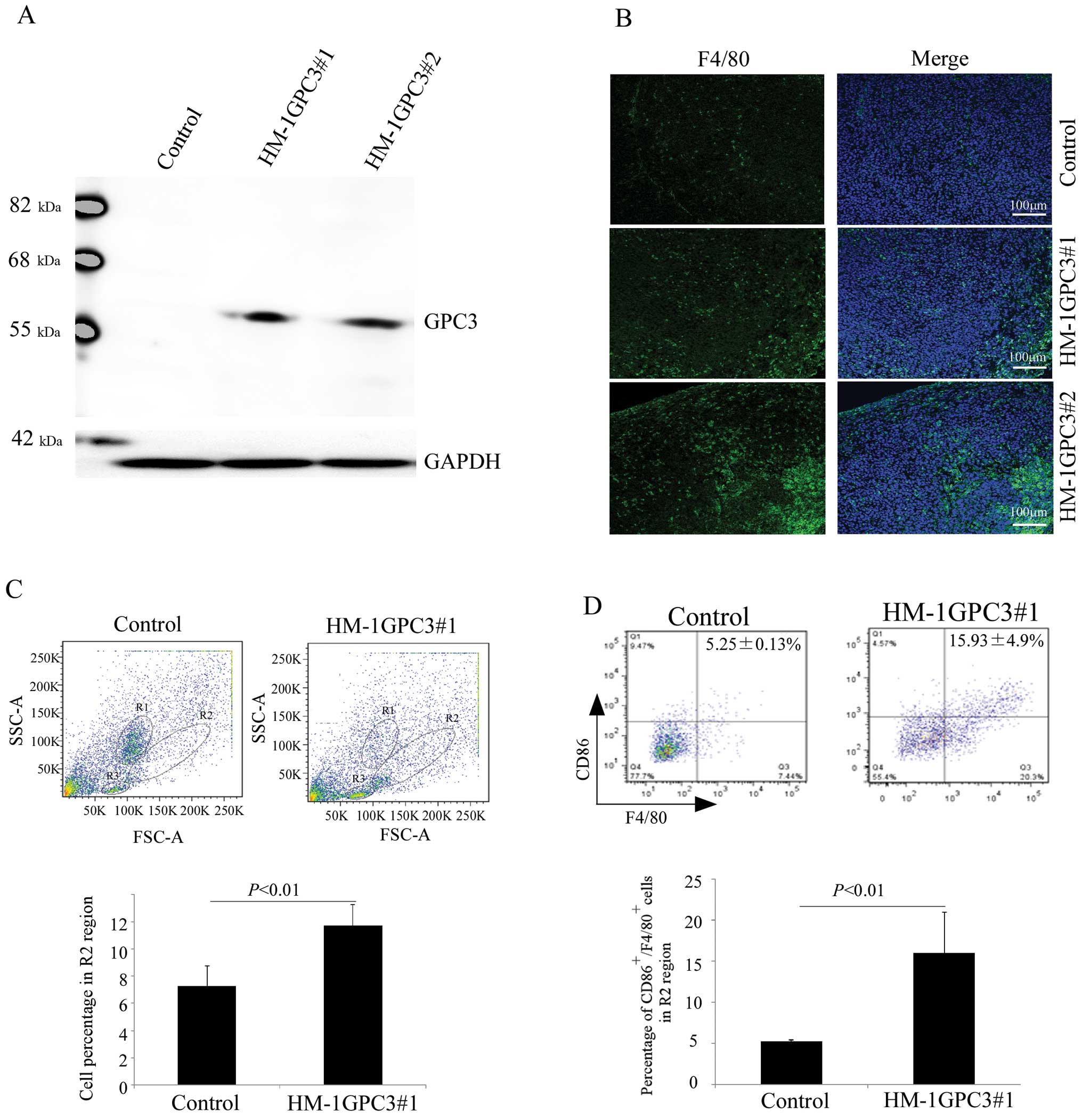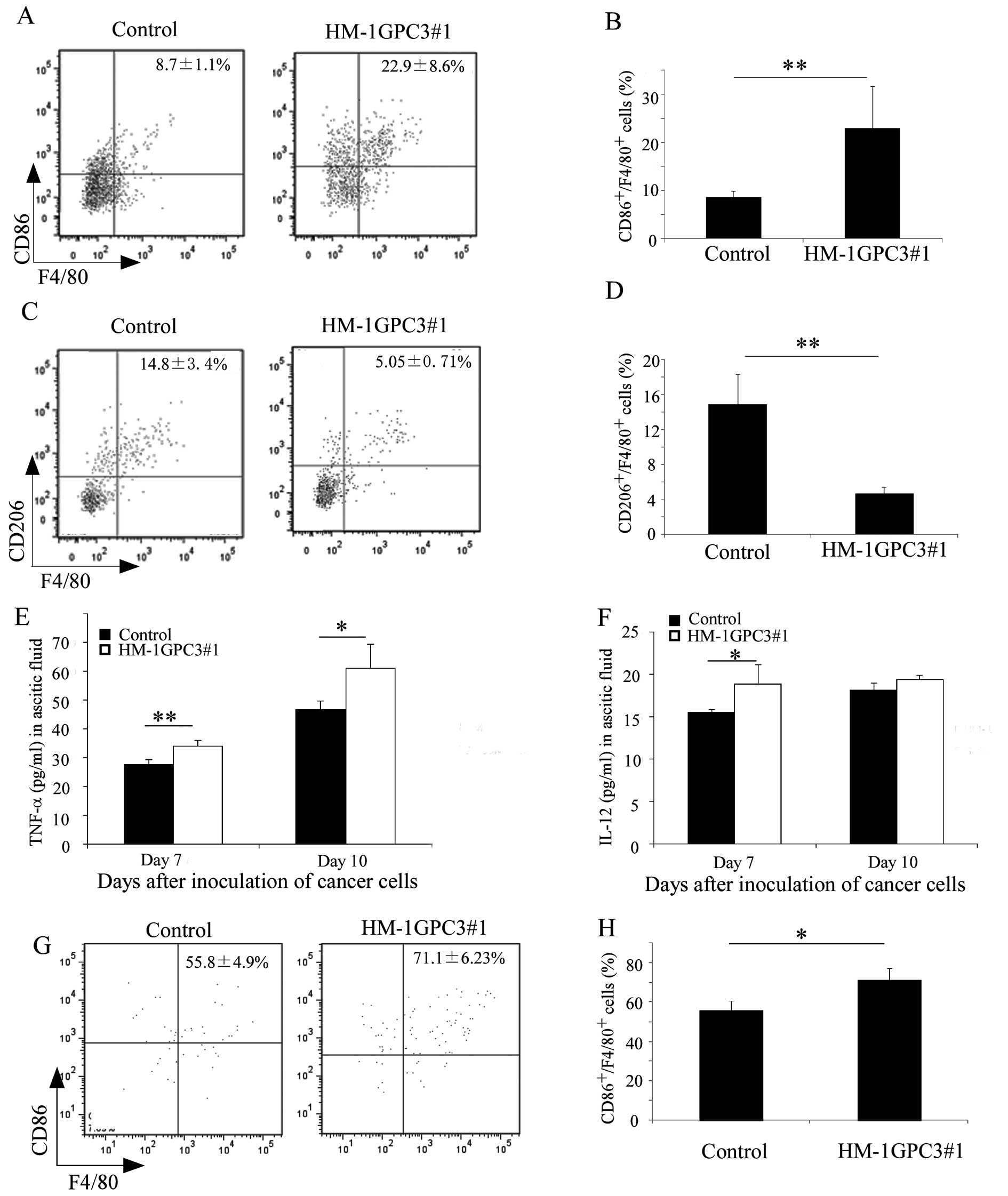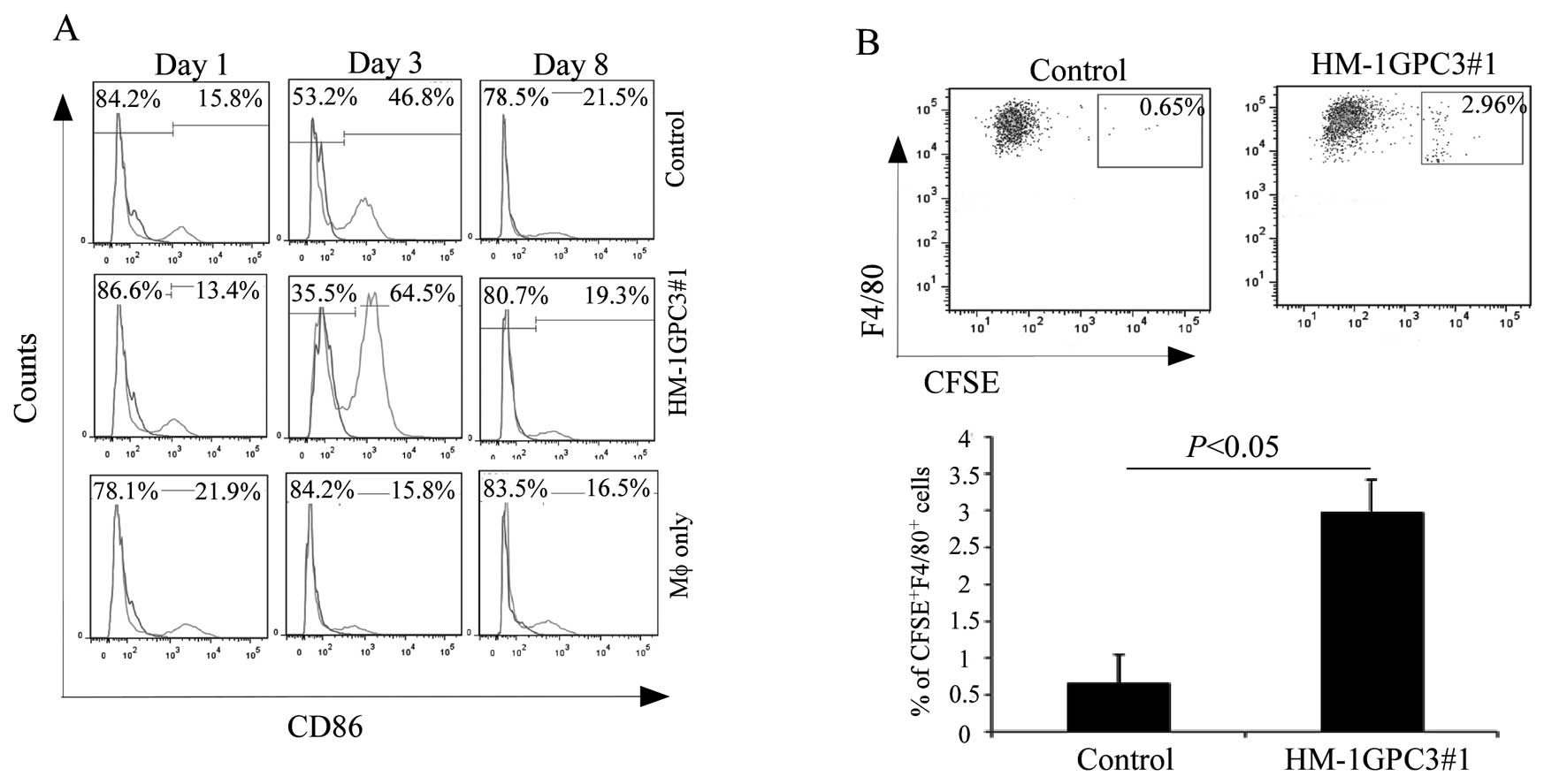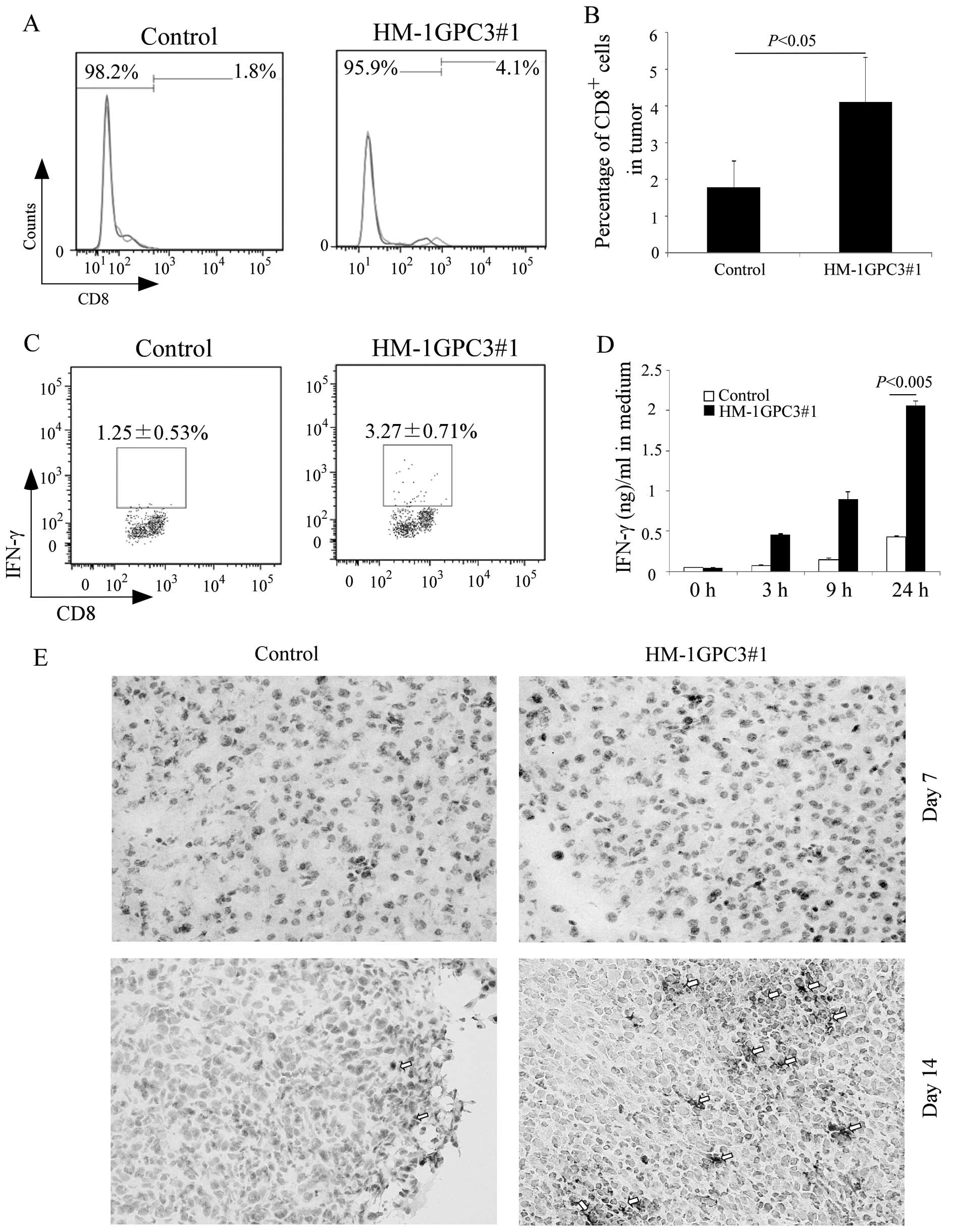|
1
|
Fransson LA: Glypicans. Int J Biochem Cell
Biol. 35:125–129. 2003. View Article : Google Scholar
|
|
2
|
Stadlmann S, Gueth U, Baumhoer D, Moch H,
Terracciano L and Singer G: Glypican-3 expression in primary and
recurrent ovarian carcinomas. Int J Gynecol Pathol. 26:341–344.
2007. View Article : Google Scholar : PubMed/NCBI
|
|
3
|
Maeda D, Ota S, Takazawa Y, et al:
Glypican-3 expression in clear cell adenocarcinoma of the ovary.
Mod Pathol. 22:824–832. 2009.PubMed/NCBI
|
|
4
|
Capurro M, Wanless IR, Sherman M, et al:
Glypican-3: a novel serum and histochemical marker for
hepatocellular carcinoma. Gastroenterology. 125:89–97. 2003.
View Article : Google Scholar : PubMed/NCBI
|
|
5
|
Nakatsura T, Yoshitake Y, Senju S, et al:
Glypican-3, overexpressed specifically in human hepatocellular
carcinoma, is a novel tumor marker. Biochem Biophys Res Commun.
306:16–25. 2003. View Article : Google Scholar : PubMed/NCBI
|
|
6
|
Lin Q, Xiong LW, Pan XF, et al: Expression
of GPC3 protein and its significance in lung squamous cell
carcinoma. Med Oncol. 29:663–669. 2012. View Article : Google Scholar : PubMed/NCBI
|
|
7
|
Nakatsura T, Kageshita T, Ito S, et al:
Identification of glypican-3 as a novel tumor marker for melanoma.
Clin Cancer Res. 10:6612–6621. 2004. View Article : Google Scholar : PubMed/NCBI
|
|
8
|
Capurro MI, Xu P, Shi W, Li F, Jia A and
Filmus J: Glypican-3 inhibits Hedgehog signaling during development
by competing with patched for Hedgehog binding. Dev Cell.
14:700–711. 2008. View Article : Google Scholar : PubMed/NCBI
|
|
9
|
Lai JP, Oseini AM, Moser CD, et al: The
oncogenic effect of sulfatase 2 in human hepatocellular carcinoma
is mediated in part by glypican 3-dependent Wnt activation.
Hepatology. 52:1680–1689. 2010. View Article : Google Scholar : PubMed/NCBI
|
|
10
|
Gao W and Ho M: The role of glypican-3 in
regulating Wnt in hepatocellular carcinomas. Cancer Rep. 1:14–19.
2011.PubMed/NCBI
|
|
11
|
Lin H, Huber R, Schlessinger D and Morin
PJ: Frequent silencing of the GPC3 gene in ovarian cancer cell
lines. Cancer Res. 59:807–810. 1999.PubMed/NCBI
|
|
12
|
Kim H, Xu GL, Borczuk AC, et al: The
heparan sulfate proteoglycan GPC3 is a potential lung tumor
suppressor. Am J Respir Cell Mol Biol. 29:694–701. 2003. View Article : Google Scholar : PubMed/NCBI
|
|
13
|
Suzuki S, Yoshikawa T, Hirosawa T, et al:
Glypican-3 could be an effective target for immunotherapy combined
with chemotherapy against ovarian clear cell carcinoma. Cancer Sci.
102:1622–1629. 2011. View Article : Google Scholar : PubMed/NCBI
|
|
14
|
Suzuki S, Shibata K, Kikkawa F and
Nakatsura T: Significant clinical response of progressive recurrent
ovarian clear cell carcinoma to glypican-3-derived peptide vaccine
therapy: two case reports. Hum Vaccin Immunother. 10:338–343. 2014.
View Article : Google Scholar : PubMed/NCBI
|
|
15
|
Fatourou EM and Koskinas JS: Adaptive
immunity in hepatocellular carcinoma: prognostic and therapeutic
implications. Expert Rev Anticancer Ther. 9:1499–1510. 2009.
View Article : Google Scholar : PubMed/NCBI
|
|
16
|
Hiroishi K, Eguchi J, Baba T, et al:
Strong CD8(+) T-cell responses against tumor-associated
antigens prolong the recurrence-free interval after tumor treatment
in patients with hepatocellular carcinoma. J Gastroenterol.
45:451–458. 2010.
|
|
17
|
Yoshikawa T, Nakatsugawa M, Suzuki S, et
al: HLA-A2-restricted glypican-3 peptide-specific CTL clones
induced by peptide vaccine show high avidity and antigen-specific
killing activity against tumor cells. Cancer Sci. 102:918–925.
2011. View Article : Google Scholar
|
|
18
|
Tada F, Abe M, Hirooka M, et al: Phase
I/II study of immunotherapy using tumor antigen-pulsed dendritic
cells in patients with hepatocellular carcinoma. Int J Oncol.
41:1601–1609. 2012.PubMed/NCBI
|
|
19
|
Webb LM, Ehrengruber MU, Clark-Lewis I,
Baggiolini M and Rot A: Binding to heparan sulfate or heparin
enhances neutrophil responses to interleukin 8. Proc Natl Acad Sci
USA. 90:7158–7162. 1993. View Article : Google Scholar : PubMed/NCBI
|
|
20
|
Wang D, Sai J and Richmond A: Cell surface
heparan sulfate participates in CXCL1-induced signaling.
Biochemistry. 42:1071–1077. 2003. View Article : Google Scholar : PubMed/NCBI
|
|
21
|
Slimani H, Charnaux N, Mbemba E, et al:
Binding of the CC-chemokine RANTES to syndecan-1 and syndecan-4
expressed on HeLa cells. Glycobiology. 13:623–634. 2003. View Article : Google Scholar : PubMed/NCBI
|
|
22
|
Hamon M, Mbemba E, Charnaux N, et al: A
syndecan-4/CXCR4 complex expressed on human primary lymphocytes and
macrophages and HeLa cell line binds the CXC chemokine stromal
cell-derived factor-1 (SDF-1). Glycobiology. 14:311–323. 2004.
View Article : Google Scholar : PubMed/NCBI
|
|
23
|
Fernandez-Botran R, Yan J and Justus DE:
Binding of interferon gamma by glycosaminoglycans: a strategy for
localization and/or inhibition of its activity. Cytokine.
11:313–325. 1999. View Article : Google Scholar : PubMed/NCBI
|
|
24
|
Leonetti M, Gadzinski A and Moine G: Cell
surface heparan sulfate proteoglycans influence MHC class
II-restricted antigen presentation. J Immunol. 185:3847–3856. 2010.
View Article : Google Scholar : PubMed/NCBI
|
|
25
|
Takai H, Kato A, Kato C, et al: The
expression profile of glypican-3 and its relation to macrophage
population in human hepatocellular carcinoma. Liver Int.
29:1056–1064. 2009. View Article : Google Scholar : PubMed/NCBI
|
|
26
|
Takai H, Ashihara M, Ishiguro T, et al:
Involvement of glypican-3 in the recruitment of M2-polarized
tumor-associated macrophages in hepatocellular carcinoma. Cancer
Biol Ther. 8:2329–2338. 2009. View Article : Google Scholar : PubMed/NCBI
|
|
27
|
Van Ginderachter JA, Movahedi K,
Hassanzadeh Ghassabeh G, et al: Classical and alternative
activation of mononuclear phagocytes: picking the best of both
worlds for tumor promotion. Immunobiology. 211:487–501.
2006.PubMed/NCBI
|
|
28
|
Gabrilovich DI, Ostrand-Rosenberg S and
Bronte V: Coordinated regulation of myeloid cells by tumours. Nat
Rev Immunol. 12:253–268. 2012. View Article : Google Scholar : PubMed/NCBI
|
|
29
|
Dunn GP, Old LJ and Schreiber RD: The
immunobiology of cancer immunosurveillance and immunoediting.
Immunity. 21:137–148. 2004. View Article : Google Scholar : PubMed/NCBI
|
|
30
|
Murdoch C, Giannoudis A and Lewis CE:
Mechanisms regulating the recruitment of macrophages into hypoxic
areas of tumors and other ischemic tissues. Blood. 104:2224–2234.
2004. View Article : Google Scholar : PubMed/NCBI
|
|
31
|
Komori H, Nakatsura T, Senju S, et al:
Identification of HLA-A2-or HLA-A24-restricted CTL epitopes
possibly useful for glypican-3-specific immunotherapy of
hepatocellular carcinoma. Clin Cancer Res. 12:2689–2697. 2006.
View Article : Google Scholar : PubMed/NCBI
|
|
32
|
Mantovani A, Sica A, Sozzani S, Allavena
P, Vecchi A and Locati M: The chemokine system in diverse forms of
macrophage activation and polarization. Trends Immunol. 25:677–686.
2004. View Article : Google Scholar : PubMed/NCBI
|
|
33
|
Lasek W, Feleszko W, Golab J, et al:
Antitumor effects of the combination immunotherapy with
interleukin-12 and tumor necrosis factor alpha in mice. Cancer
Immunol Immunother. 45:100–108. 1997. View Article : Google Scholar : PubMed/NCBI
|
|
34
|
Wrenshall LE, Stevens RB, Cerra FB and
Platt JL: Modulation of macrophage and B cell function by
glycosaminoglycans. J Leukoc Biol. 66:391–400. 1999.PubMed/NCBI
|
|
35
|
Chen C, Gault A, Shen L and Nabavi N:
Molecular cloning and expression of early T cell costimulatory
molecule-1 and its characterization as B7-2 molecule. J Immunol.
152:4929–4936. 1994.PubMed/NCBI
|
|
36
|
Serre K, Giraudo L, Siret C, Leserman L
and Machy P: CD4 T cell help is required for primary CD8 T cell
responses to vesicular antigen delivered to dendritic cells in
vivo. Eur J Immunol. 36:1386–1397. 2006. View Article : Google Scholar : PubMed/NCBI
|
|
37
|
Cullen SP and Martin SJ: Mechanisms of
granule-dependent killing. Cell Death Differ. 15:251–262. 2008.
View Article : Google Scholar : PubMed/NCBI
|



















